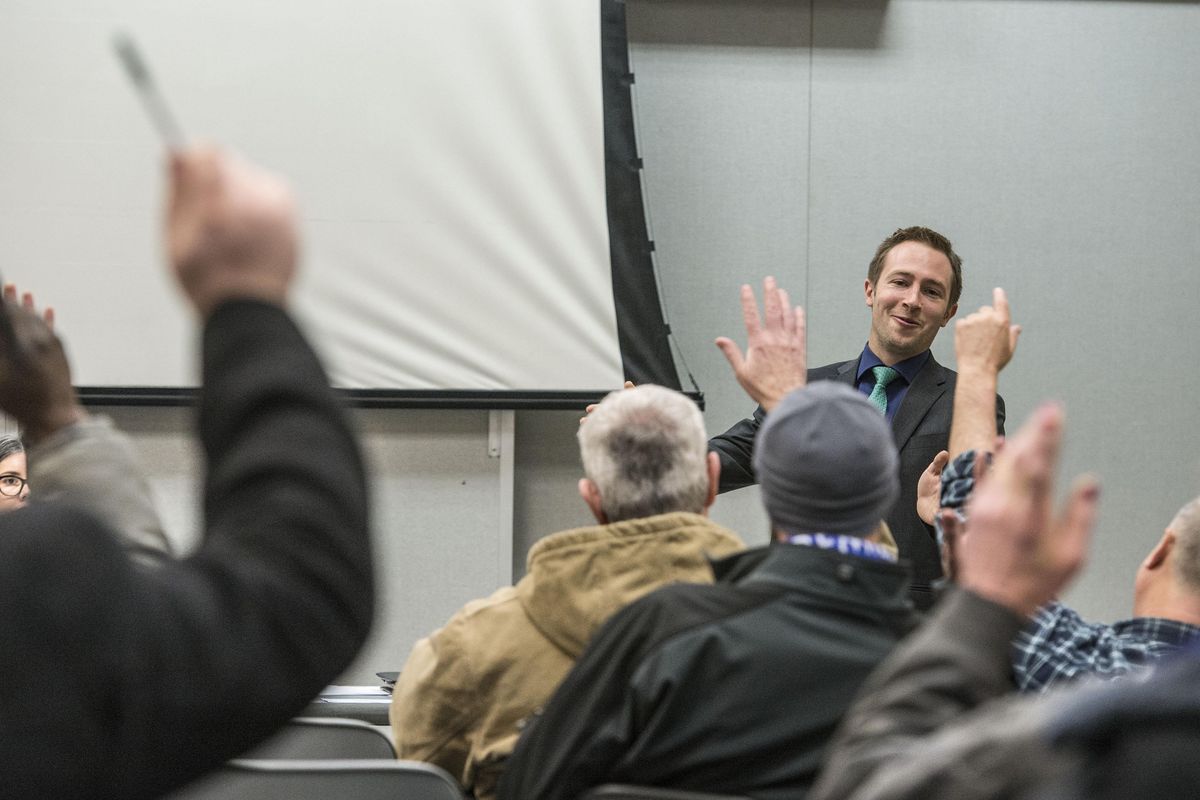Center for Justice holds clinic to help people remove criminal convictions

Justin Petrilli signed a guilty plea for a misdemeanor assault in 2015 because he didn’t want to leave his disabled wife alone at home while he spent time in jail.
He maintains he never assaulted anyone and said his public defender discouraged him from going to trial even though he had a witness who was with him at the time of the alleged assault.
Before his arrest, he worked at Yoke’s and seasonally at Wal-Mart. Now, he’s been rejected applying for similar retail jobs.
“I haven’t been able to work since I was charged with it,” he said. “I didn’t realize signing a plea agreement would send me to this whole world of trouble.”
Petrilli was one of about 30 people who visited a Center for Justice legal clinic Wednesday hoping to have criminal convictions taken off their records.
Family law attorney Cam Zorrozua, a Center for Justice board member, and criminal defense attorney Alex Biel, who works at the Center for Justice, offered consultations and talked people through the process of getting a conviction removed.
Zorrozua said many of the people she spoke to had no idea it was possible to have a criminal conviction taken off their record.
“There were some people who had convictions in here in the 1970s,” she said.
To have a conviction vacated, a person must first pay off all legal financial obligations, then get a certificate of discharge from the court. Some of the people at the clinic hadn’t yet paid off those obligations, which accrue 12 percent interest, even while a person is in prison.
Depending on the charge, a person has to wait between three and 10 years after that before they’re eligible to have a conviction removed, Biel said. They cannot have any pending criminal charges, and violent felonies or felonies against people are not eligible to be removed.
“The hoops that they’re making you jump through is to illustrate to the state that you have led this law-abiding life for a certain period of time,” Biel explained to the group.
Many people seeking to have records vacated are just trying to get a job or housing without having to check a box saying they have a conviction.
Connie Nelson, a social worker with Shalom Ministries who helped organize the clinic, said having a criminal record is often a bigger barrier for her clients than a severe mental illness or addiction.
“We limit their ability to get housing based on that record. We limit their ability to get employment based on that record,” Nelson said.
That keeps people who want to work and pay for their own apartments dependent on food stamps, Medicaid and subsidized housing, she said.
“Who’s paying for that? You are. I am. And as a social worker, I don’t make that much,” she said.
Some people were hoping to have particular rights restored.
Tammy, who declined to give her last name because she did not want her full name associated with her criminal record, was hoping to have her gun rights restored after being convicted of theft, forgery and drug possession in 1984.
She began using heroin to cope with grief from her daughter’s death, she said.
“The day after my daughter’s funeral, somebody gave me drugs and said it would help me feel better, and it did,” she said. She eventually got clean in 1990 and said she used to have to lie on job applications so she could work.
Since her conviction is 30 years in the past, it doesn’t come up much now, she said. But she’d like to be able to own a gun to protect herself.
Biel told her that was a separate petition outside the legal clinic, but gave her contact information so she could move forward with that. Tammy also filled out a form to have the old conviction taken off her record.
“It sucks the way the system is set up if you turn your life around,” she said.
After talking to two lawyers, Petrilli was optimistic he’d eventually be able to remove his misdemeanor from his record, though he hasn’t gone through the three-year waiting period yet.
“They’re saying I might be able to get my good name back,” he said. “It feels pretty good.”
This story has been updated to correctly identify Alex Biel as a Center for Justice staff member, not a board member.